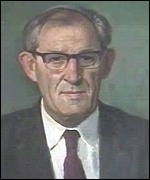Dugald Baird
Dugald Baird | |
|---|---|
 Portrait of Sir Dugald Baird | |
| Born | 16 November 1899 |
| Died | 7 November 1986 (aged 86) Edinburgh, Scotland |
| Citizenship | British |
| Education | University of Glasgow |
| Medical career | |
| Profession | gynaecologist and obstetrician |
| Institutions | University of Aberdeen |
Sir Dugald Baird FRCOG (16 November 1899 – 7 November 1986)[1] was a British medical doctor and a professor of obstetrics and gynaecology. Baird was most notable and influential in calling for the liberalising of abortion.[2] In his delivery of the Sandoz lecture in November 1961, titled the Fifth Freedom, he advocated for freedom from the tyranny of fertility.[3]
Career
[edit]Baird was born in Greenock on 16 November 1899 to David Baird, head of the science department at Greenock Academy, and his wife May.[1][4][5] He studied science and medicine at the University of Glasgow, graduating with an MB ChB in 1922 and went on to receive an MD with honours.[1] His early experiences attending births in the Glasgow slums and in the city's Royal Maternity Hospital shaped his interest in the social and economic influences on the health of women, their babies, and across generations.[5] He was awarded Fellowship of the Royal College of Obstetricians and Gynaecologists in 1935.
He moved to Aberdeen in 1936 as Regius Professor of Midwifery at the University of Aberdeen.[6] During the next three decades, his main interests were in the areas of clinical practice, service provision and health policy in reproductive health, perinatal and maternal mortality, social obstetrics, sterilisation, induced abortion, and cervical screening. With his wife Lady Matilda Deans Baird, also a physician, Baird established the first free family planning clinic in Aberdeen.
In 1951 he set up the Aberdeen Maternity and Neonatal Databank, which continues today to link all the obstetric and fertility-related events occurring to women from a defined population.[7]
Baird formally retired in 1965.[8] He died on 7 November 1986.
Family
[edit]Baird and his wife had four children, two daughters and two sons. Their daughter, Joyce Baird worked as a doctor specialising in diabetes at the Western General Hospital in Edinburgh.[9] Their son D. T. Baird, was instrumental in gaining approval for the use of RU-486 in the UK as an emergency contraceptive.[10] Their son, D. Euan Baird, retired as CEO and Chairman of the Board of Schlumberger Ltd. in 2003, after a long career with the company.[citation needed]
Awards and honours
[edit]In 1966, the Freedom of the City of Aberdeen was conferred on Baird and his wife for their contribution to medical science and health in the City and beyond.[8]
He received an honorary doctorate from the University of Stirling in 1974.[11]
The antenatal clinic at Foresterhill had been named after him in 1970.[12] The Dugald Baird Centre for Research on Women's Health at Aberdeen Maternity Hospital is named in his honour.
He and his wife are commemorated by plaques at 38 Albyn Place, Aberdeen.[13][14]
The Baird Family Hospital due to open in Aberdeen in 2020 is named for him, his wife, their daughter Joyce and son David, in recognition of the medical contributions they have all made in Scotland and to the profession. The hospital will offer maternity, gynaecology, breast screening and breast surgery services, as well as a neonatal unit, a centre for reproductive medicine, an operating theatre suite and teaching facilities.[15]
References
[edit]- ^ a b c "Dugald Baird". www.oxforddnb.com. 2004. doi:10.1093/ref:odnb/40060. Retrieved 27 November 2016.
- ^ Willocks, James; Barr, Wallace (2004). Ian Donald : a memoir. London: RCOG Press. p. 107. OCLC 57382713.
- ^ Baird, Dugald (13 November 1965). "A Fifth Freedom?". The British Medical Journal. 2 (5471). Jstor: BMJ: 1141–1148. doi:10.1136/bmj.2.5471.1141. JSTOR 25404411. PMC 1846991. PMID 5833617.
- ^ Thomas, Donald. "Dugald Baird - Aberdeen Medico-Chirurgical Society". www.med-chi.co.uk. Retrieved 28 August 2023.
- ^ a b Davis, Gayle. "The Great Divide: The Policy and Practice of Abortion in 1960s Scotland". Royal College of Physicians of Edinburgh. Archived from the original on 25 July 2015. Retrieved 25 July 2015.
- ^ "Academic Obstetrics and Gynaecology: History". University of Aberdeen. Retrieved 16 June 2014.
- ^ "Academic groups: Immpact: Our work: History". University of Aberdeen. Retrieved 16 June 2014.
- ^ a b "Sir Dugald Baird dies". Glasgow Herald. Glasgow. 11 November 1986. Retrieved 16 June 2014.
- ^ "Obitiuary: Joyce Baird, Doctor, 85". www.edinburghnews.scotsman.com. Archived from the original on 28 November 2016. Retrieved 21 November 2020.
- ^ "Who's Who". www.ukwhoswho.com. Retrieved 27 November 2016.
- ^ "Stirling doctorate for African writer". Glasgow Herald. Glasgow. 27 April 1974. p. 3. Retrieved 25 July 2015.
- ^ "Tribute to Sir Dugald Baird". Glasgow Herald. Glasgow. 20 March 1970. p. 25. Retrieved 25 July 2015.
- ^ "Sir Dugald Baird (1899-1986)". Aberdeen Medico-Chirurgical Society. Retrieved 16 September 2014.
- ^ "Commemorative Plaques Record Details Sir Dugald Baird (1899 - 1986)". Aberdeen City Council. Archived from the original on 5 March 2016. Retrieved 26 July 2015.
- ^ "NHS Grampian - the Baird Family Hospital and ANCHOR Centre".


 French
French Deutsch
Deutsch